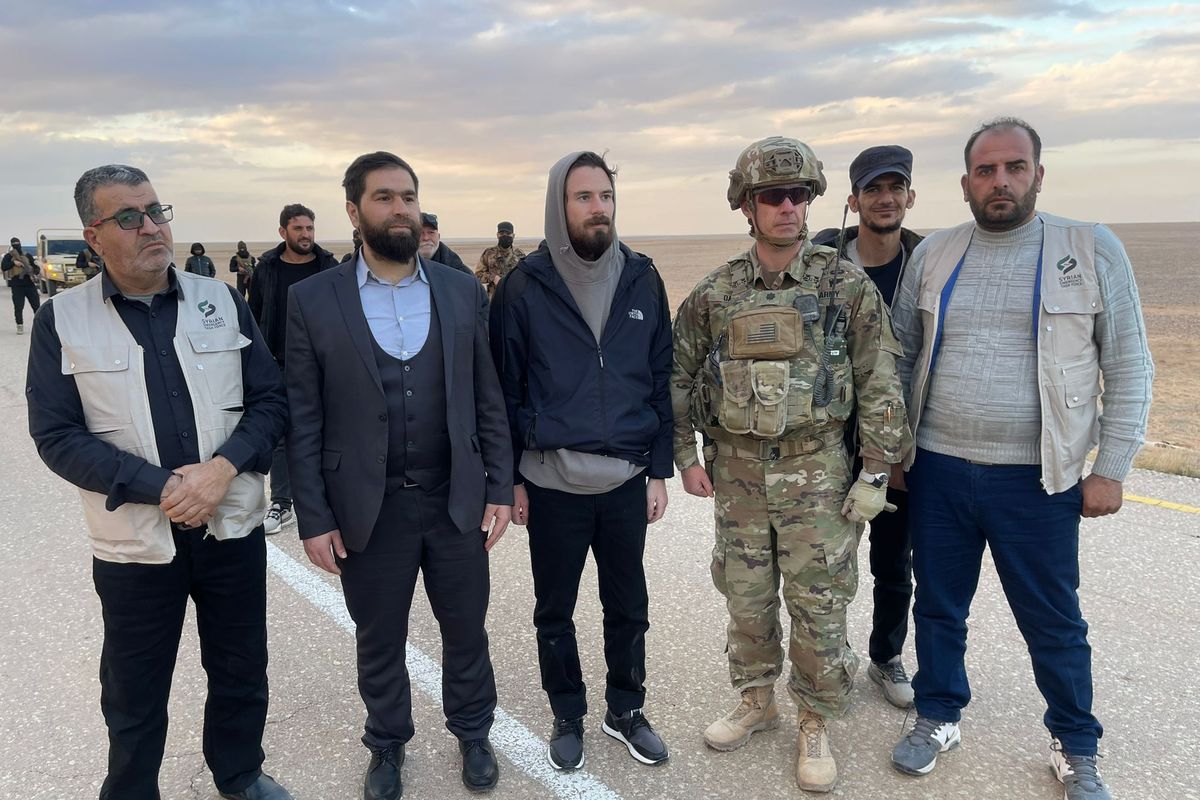U.S. officials in direct contact with Syria’s new Islamist leaders
People celebrate with the Syrian opposition flag on Tuesday in Damascus, Syria. (Omar Haj Kadour/AFP)
AQABA, Jordan – The Biden administration has been in direct contact with the new Islamist rulers of Syria, Secretary of State Antony Blinken said Saturday, as Washington races to adjust to the sudden ouster of President Bashar Assad.
It was the first acknowledgment of direct contact with a group, Hayat Tahrir al-Sham (HTS), that remains on a State Department terrorism list, and reflects the U.S. government’s efforts to balance its desire for stability in Syria with concerns about the Turkish-backed rebels who collapsed the Assad family’s decades-long rule in less than two weeks. HTS once was affiliated with al-Qaeda but broke from the group and says it has moderated, but concerns remain about it will treat minorities, women and others as it seeks to solidify control.
Blinken has been in the Middle East for days, holding meetings in Jordan, Turkey and Iraq to coordinate regional powers and generate pressure for an inclusive political transition in Syria. Assad’s ouster has unsettled the region, empowering Turkey, depriving Iran of a proxy and raising questions about the fate of Syria’s many minority groups.
“Syria has changed more in less than a week than in any week this last half-century,” Blinken told reporters after a day of meetings here in the Red Sea port city of Aqaba.
Blinken said the United States and its partners agreed on a slate of principles they hope Syria’s interim leaders will adhere to in exchange for support and recognition of a future Syrian government. He called for the rights of minorities and women to be respected, the transition to produce “an inclusive and representative government,” zero tolerance for terrorist groups, and the destruction of stockpiles of chemical weapons.
The top U.S. diplomat said that in U.S. officials have made clear to HTS and “other parties” Washington’s desire that the group follow the principles he discussed with regional leaders, and that they have “impressed upon everyone” a desire for help locating missing American journalist Austin Tice.
Tice was abducted in Syria in 2012 while reporting on the country’s civil war. It’s unclear if he is still alive. HTS’s political wing has signaled that the group was actively looking for him, and vowed to “cooperate directly with the U.S. administration” to search for all American citizens “disappeared by the former Assad regime.”
On Friday, HTS handed over to the U.S. military another American, Travis Timmerman, who was discovered this week outside Damascus, Syria’s capital. Timmerman has said was freed from a Syrian prison after seven months in captivity, having been detained upon crossing into the country from Lebanon as part a “pilgrimage.”
The Biden administration had not previously acknowledged having high-level direct contacts with HTS, saying instead that it had been passing messages through intermediaries, notably Turkey.
Turkish-backed forces also have been battling the U.S.-backed, Kurdish-led Syrian Democratic Forces, who have control over Syria’s northeast and have been important partners in the battle against the Islamic State. Blinken has urged the Turks to hold back, concerned Syria could descend into chaos as each faction battles for territory and advantage.
He warned Saturday that “this is a moment of vulnerability in which ISIS will seek to regroup.”
Blinken started his trip in Aqaba on Thursday, meeting Jordan’s King Abdullah II and Foreign Minister Ayman al-Safadi before flying to Turkey’s capital for a meeting with Turkish President Recep Tayyip Erdogan. On Friday, he traveled to Baghdad to meet Iraqi Prime Minister Mohammed Shia al-Sudani before returning to this coastal Jordanian resort city for broader talks with counterparts from countries that have a stake in Syria’s future.
At Saturday’s meeting, diplomats from Jordan, Lebanon, Saudi Arabia, Egypt, the United Arab Emirates, Bahrain, Qatar, Turkey, France, Germany and the European Union declared that Syria “finally has the chance to end decades of isolation,” encouraging the new leadership to foster an inclusive transition.
The countries said they are committed “to supporting and working with the Syrian people as they embark on this unprecedented transition.”
In meetings earlier this week with the top U.S. diplomat, Turkish leaders told Blinken that the PKK, a Kurdish militant group, has been continuing to attack them in recent weeks, a U.S. official said, speaking on the condition of anonymity to speak frankly about sensitive diplomatic talks. They also told Blinken that they need to respond, even though they said they agreed with the U.S. position that they don’t want to do anything that would allow the Islamic State to regroup, the official said. Turkey says the PKK is closely linked with Kurdish groups inside Syria.
In his meeting in Baghdad with Sudani, Blinken pushed the Iraqi leader not to allow Iran to jeopardize Syria’s future by allowing weapons transits that could fuel the conflict there, the official said.
Sudani responded by saying that Iraq was keen not to get dragged into any conflicts, the official said. Iran’s influence over Iraq has been a major concern for Washington, which has been trying to squeeze off routes for weapons into Syria as HTS marched toward Damascus.
Assad was long a major client of Tehran, accepting Iranian weaponry and facilitating supplies for Hezbollah, an Iran-backed militant and political group in Lebanon whose top leadership has been devastated in recent months by Israeli attacks.

